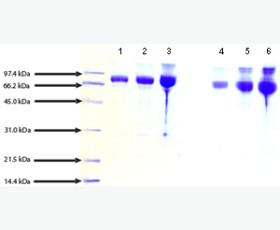Recombinant Human Mesothelin
| Product name: | Recombinant Human Mesothelin |
| Source: | Human Cells |
| Purity: | Greater than 95% as determined by reducing SDS-PAGE. |
| Buffer Formulation: | Lyophilized from a 0.2 μm filtered solution of PBS, pH7.4. |
| Applications: | Applications:SDS-PAGE; WB; ELISA; IP. |
| Storage: | Avoid repeated freeze/thaw cycles. Store at 2-8 oC for one month. Aliquot and store at -80 oC for 12 months. |
| UOM: | 100ug/50ug/200ug/1mg/1g |
| Source | Human Cells |
| Description | Recombinant Human Mesothelin is produced by our Mammalian expression system and the target gene encoding Glu296-Ser598 is expressed with a 6His tag at the C-terminus. |
| Names | Megakaryocyte potentiating factor; mesothelin; Pre-pro-megakaryocyte-potentiating factor; soluble MPF mesothelin related protein;CAK1; MPF; MSLN; SMR; CAK1; CAK1 antigen |
| Accession # | Q13421 |
| Formulation | Lyophilized from a 0.2 μm filtered solution of PBS, pH7.4. |
| Shipping |
The product is shipped at ambient temperature. |
| Reconstitution |
Always centrifuge tubes before opening. Do not mix by vortex or pipetting. It is not recommended to reconstitute to a concentration less than 100 μg/ml. Dissolve the lyophilized protein in ddH2O. Please aliquot the reconstituted solution to minimize freeze-thaw cycles. |
| Storage |
Lyophilized protein should be stored at < -20°C, though stable at room temperature for 3 weeks. Reconstituted protein solution can be stored at 4-7°C for 2-7 days. Aliquots of reconstituted samples are stable at < -20°C for 3 months. |
| Purity |
Greater than 95% as determined by reducing SDS-PAGE. |
| Endotoxin | Less than 0.1 ng/µg (1 IEU/µg) as determined by LAL test. |
| Amino Acid Sequence |
EVEKTACPSGKKAPEIDESLIFYKKWELEACVDAALLATQMDRVNAIPFTYEQLDVLKHKLDELY PQGYPESVIQHLGYLFLKMSPEDIRKWNVTSLETLKALLEVNKGHEMSPQVATLIDRFVKGRGQL DKDTLDTLTAFYPGYLCSLSPEELSSVPPSSIWAVRPQDLDTCDPRQLDVLYPKARLAFQNMNGS EYFVKIQSFLGGAPTEDLKALSQQNVSMDLATFMKLRTDAVLPLTVAEVQKLLGPHVEGLKAEER HRPVRDWILRQRQDDLDTLGLGLQGGIPNGYLVLDLSMQEALSHHHHHH
|
| Background | Mesothelin is a cell surface glycoprotein whose expression is limited to mesothelial cells of the serosa (pleura, pericardium, and peritoneum) and epithelial cells of the trachea, tonsils, fallopian tube, and kidneys. Mesothelin plays an important role in cell survival, proliferation, migration, invasion, tumor progression, and resistance to chemotherapy. The overexpression of mesothelin can activate NF-κB and signal transducer and activator of transcription 3 (Stat3), inhibit apoptotic signaling and TNF-α-induced apoptosis, and accelerate the G1–S transition. Mesothelin is also found overexpressed in various cancers, including malignant mesothelioma, pancreatic or ovarian carcinoma, sarcomas and in some gastrointestinal or pulmonary carcinomas. As a result of its limited expression in normal tissues, mesothelin has been reported as an ideal tumor-associated marker for the development of targeted therapy. |














